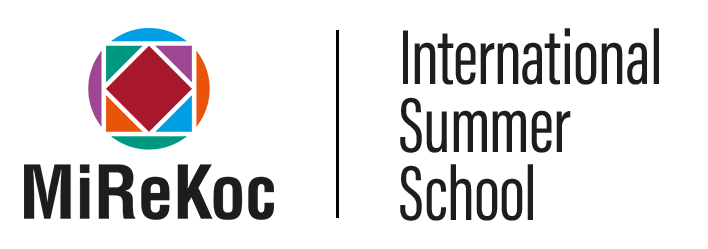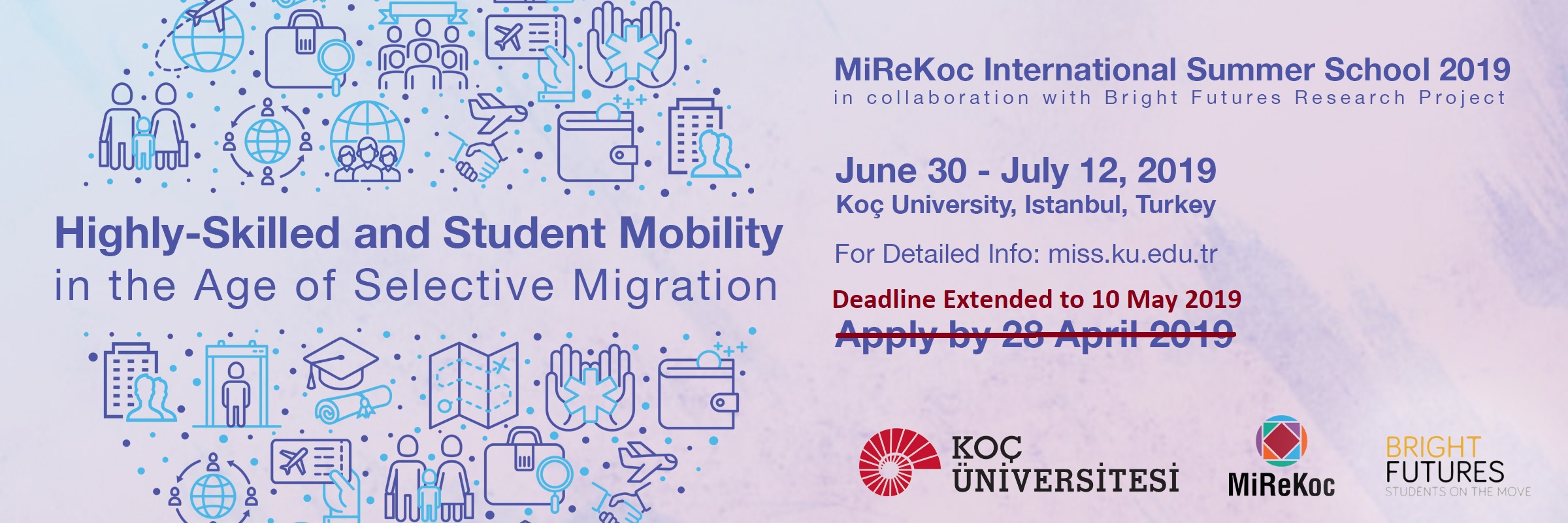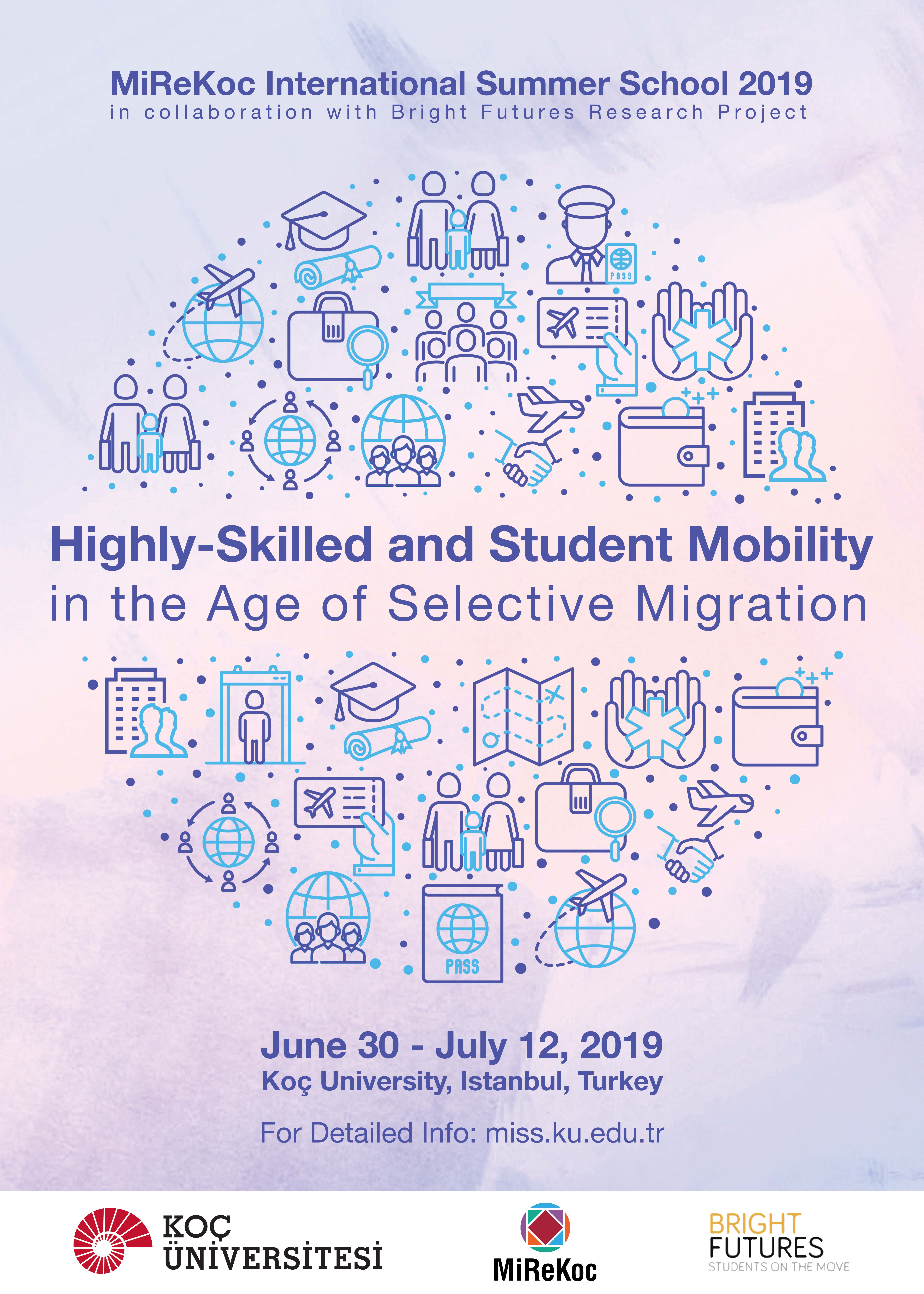MiReKoc 2019 International Summer School
Highly-Skilled and Student Mobility in the Age of Selective Migration
June 30 – July 12, 2019
Rumelifeneri Campus, Koc University, Istanbul
Cross-border mobility of students and highly-skilled people has been for some time and remains today a significant phenomenon. The number of international students has grown considerably in the early 21st century: for instance, according to the OECD figures, in 2000 the global number of students enrolled in tertiary education outside their country of citizenship was two million; by 2015 that had increased to four and a half million, representing an average annual growth of almost 7 percent. Similarly, in 2010 there were about 28 million high-skilled migrants residing in the OECD countries, indicating an increase of nearly 130 percent since 1990. Parallel to this increase, the international movements of students and highly-skilled people receive growing attention, particularly since they relate to delicate topics of public concern including education, migration, and development.
The importance of human capital has become a basis for selection of migration in many countries. For instance, the Blue Card Scheme in Europe envisages a human capital approach. The scheme evaluates accredited skills when selecting and identifying ‘desirable migrants’ and gives them a privileged status, while the EU countries’ policy approach against low-skilled or refugee groups is based on blocking entry into their countries. The conceptions of knowledge society and economy, coupled with globalized and technology driven markets, create a complex interplay between origin and destination countries. The literature on skilled migration elaborates on this interplay, most significantly through discussions on “brain drain”, “brain gain” or “brain circulation” analyzing return the instances where migrants bring their skills and work experience from abroad back to their countries of origin and boost productivity; or where countries of origin struggle with the loss of their highly-skilled labour force.
Along with their impact on the countries of origin and destination, the complex and interrelated drivers of cross-border mobility of students and highly-skilled people are essential topics for discussion in this field. Economic, cultural, political, and social factors both in origin and destination countries influence migration and return flows. The increasingly transnational nature of higher education plays a significant role in creating mobility aspirations and broader life course expectations. In addition, individual level factors, such as parental and socio-economic backgrounds, and social networks and available infrastructures also impact on decisions to pursue careers or education abroad.
In parallel the diversity of topics in the field, academic research on the cross-border mobility of students and highly-skilled people is multidisciplinary, incorporating knowledge from fields such as sociology, political economy, public policy, education, development studies, international law, and migration studies. Accordingly, with a multidisciplinary perspective and for gaining a comprehensive understanding, Migration Research Center at Koç University (MiReKoc) collaborates with the Bright Futures Project Team (www.brightfutures-project.com) to organize the 9th MiReKoc International Summer School, which will be held between June 30 and July 12, 2019 at Koç University, Istanbul on the theme of cross-border highly-skilled and student migration. The International Summer School program will focus on theoretical, methodological and thematic aspects of highly skilled and student migration and will elaborate on the following questions: How to theorize these movements in relation to migrant selectivity? What are the directions and patterns of these movements? What are the drivers of these flows? What are the regulations, policies, and strategies of national governments, international organizations, companies, and universities regarding these movements? What are the outcomes and effects of these movements for individuals themselves, origin and destination countries?
The Summer School is designed for PhD and graduate students as well as junior experts in the field. The programme includes two weeks of lectures and discussion which will be led by a distinguished international faculty members and experts in the field. The participants will have the chance of sharing their research agendas and ideas with these scholars in an interactive environment. The Summer School is conducted in English and reading materials that will be assigned for each course are also in English. The fee for the program is 1300 Euros covering lectures, course materials, food and accommodation. Only some partial scholarships are available for those who are unable to make full payment. A certificate is provided upon successful completion of the programme. Additional requirements are required on those participants who seek course credit.
Confirmed Lecturers Include:
Opening Lecture by the Honourable Mr. Marc Innes-Brown, Australian Ambassador to Türkiye
Dr Özlem Altan-Olcay, Koç University, Istanbul, Türkiye
Dr Héctor Cebolla Boado, UNED | Universidad Nacional de Educación a Distancia, Madrid, Spain
Prof Mathias Czaika, Danube University Krems, Austria
Dr Güneş Ertan, Koç University, Istanbul, Türkiye
Jean-Pierre Garson, Former Head of International Migration Division, Paris, France, OECD
Prof Ahmet İçduygu, Koç University, Istanbul, Türkiye
Dr Malasree Neepa Acharya, University of Delaware, USA
Dr Çağlar Özden, World Bank, Washington DC, USA
Dr Dorothee Schneider, University of Essex, UK
Prof Nasra M. Shah, Kuwait University, Kuwait
Prof Yasemin Soysal, University of Essex, UK
Dr Ulaş Sunata, Bahçeşehir University, Istanbul, Türkiye
Prof Biao Xiang, University of Oxford, UK
Dr Zeynep Yanaşmayan, Max Planck Institute for Social Anthropology, Berlin, Germany
Dr Ayselin Yıldız, Yaşar University, Izmir, Türkiye
30 June-12 July 2019
Where?
Koç University, Istanbul
Who can apply?
This program is designed for graduate students and PhD candidates, early career researchers, policy analysts, NGO and international organization practitioners, as well as junior experts in the field. MiReKoc International Summer School does not only offer expanding the knowledge of its attendees in the field of high skilled and student migration, but also promises networking opportunities between the attendees and distinguished faculty to enhance both parties’ research agendas. Applications from all over the world are encouraged.
Please click here for the application form and send the following documents as a single pdf file to miss@ku.edu.tr and mirekoc@ku.edu.tr:
- A current résumé
- Proof of English: TOEFL and/or IELTS scores OR an official letter signed by relevant authority stating that the medium of education is English
- One reference letter from employer or professor (The letter can also be separately e-mailed by the referees)
- Written work sample: Published or unpublished article, book chapter, thesis chapter and/or report preferably on a related migration topic, if applicable
- A statement of purpose/motivation letter: A paragraph on how you will benefit from this summer school. Please clearly indicate your specific developmental needs (e.g., publishing, reviewing, collaborative research, career issues, getting your first job, methods, etc.).
- If you are interested in participating to the MiReKoc Academic Workshops to be held within the Summer School Program, please see below “MiReKoc Academic Workshops” and attach the required documents along with your application:
- Doctoral/academic program
- Dissertation/on-going research summary
Deadline for application is midnight GMT on 10 May 2019. The results will be announced in late-May.
Please contact us via miss@ku.edu.tr if you experience technical difficulties with your application.
Tuition
- The fee for the program is 1300 Euros (covers accommodation at Koç University, Istanbul and three meals a day). The participants are responsible for their travel to Istanbul and transportation to Koç University.
- For the participants who wish to self-arrange their accommodation in Istanbul, the fee is 650 Euros.
- All fee packages cover the expenses of course materials, field trips and social programs.
Scholarship
- A limited number of partial scholarships will be available for selected candidates. Applicants who wish to apply for a scholarship should indicate their choice in the relevant section of the application form with a short statement of their financial constraints. Please note that this is a non-profit program and the scholarships will be granted based on the availability of excess funds upon the completion of the application round.
- The fees for the students from the IMISCOE network will be reduced by 25%.
MiReKoc Academic Workshops
MiReKoc encourages doctoral and post-doctoral researchers to become active members of this vibrant and diverse community. MiReKoc Academic Workshops provide a platform for participants working towards their doctorate or conducting on-going research in high-skilled or student migration studies to interact with, and learn from, fellow students and top scholars in various areas of research and scholarly inquiry. It is designed as a springboard for successful academic careers by examining important issues such as publishing, reviewing, and collaborative research; the event also provides several networking opportunities.
The MiReKoc Summer School Academic Workshops will be integrated to the Summer School programme, incorporating presentations by the researchers and discussion sessions with participants as well as renowned academics. The Academic Workshops will enable participants to approach their doctoral dissertations or on-going research with renewed vigour by engaging in discussions on research design and methodologies with renowned colleagues, and by reviewing their dissertation proposals with the help of others – fellow participants and more senior researchers who work in the respective area of scholarly inquiry.
Therefore, we expect also to send the below application details along with your application to the summer school:
- Doctoral/academic program: including affiliation, main area(s) of studies, name(s) of your supervisor(s), and stage of your PhD work
- Dissertation/on-going research summary: Approximately three pages’ description of your doctoral dissertation project, including title, a precise research question, theoretical framing, empirical research design and preliminary findings, and references. Your description should also clearly convey how data have been collected/analysed, and concisely indicate the academic field to which the thesis aims to contribute.
Other details
- The summer school seminars and readings will both be conducted in English.
- A certificate will be provided upon successful completion of the program.
- Additional requirements will be imposed on those participants who are seeking course credits (5 ECTS).
If you have any further queries, check out the FAQs guide or please contact the Summer School team via miss@ku.edu.tr.


